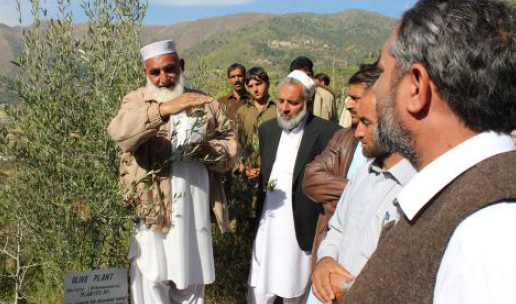Climate-change adapted plants - Olive ssp.
Farmer exposure visit to olive orchard
GIZ
The promotion of drought-resistant and climate change-adapted plants, such as olive trees, contributes to increasing the resilience of the local communities. The area in Swat is suitable for olive growing: wild olives grow here in cemeteries, which are biodiversity hotspots thanks to their protection over centuries. Olive trees can be planted on marginal lands; they bear fruit after 4-5 years of plantation and generate income by providing the source product for olive oil. Pakistan is highly dependent on the import of edible oils. The establishment of small processing plants for the production of olive oil can contribute considerably to the supply of edible oils.
The project provided 3000 high-quality olive tree seedlings to farmers in Swat, organized training on grafting and budding, and arranged an exposure visit for olive farmers to an olive-producing community for direct exchange with successful olive farmers.
• Exposure visits were important to inform future olive farmers on the importance of olive products through value addition by displaying various olive by-products (dried leaves and olive seed powder for medical treatments).
• Support of the Agricultural Research Institute (ARI) Mingora was crucial to further improve the olive value chain in Swat through different trainings of the farmers.
• The farmers should have access to markets for the products; otherwise they get discouraged.
• For promotion of biodiversity conservation to support local communities in climate change adaptation, different tools such as training, workshops, exposure visits to promising communities and institutions, use of print and electronic media etc., have to be used continuously, taking into account local culture and norms.
• The species should be selected according to the local climate and consumer preferences but importantly the species should not be exotic to distort the local biodiversity or increase species uniformity.

